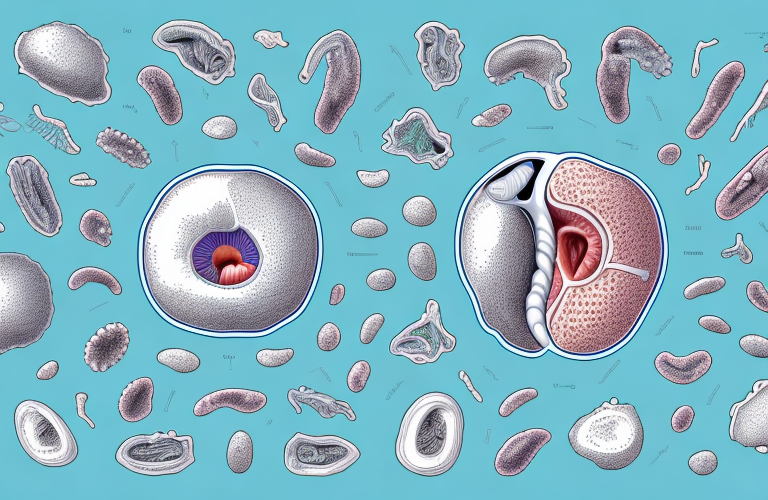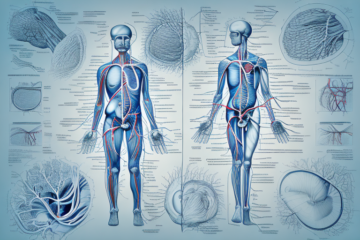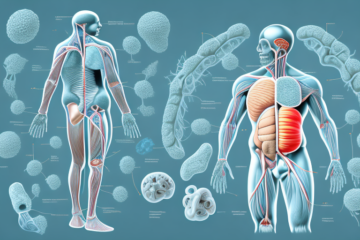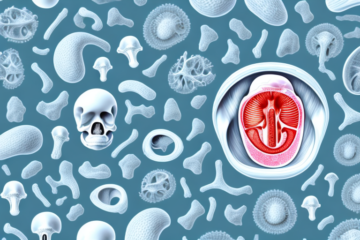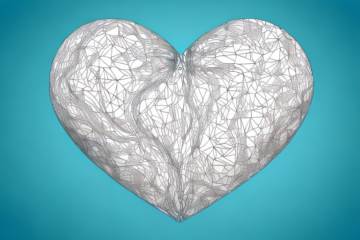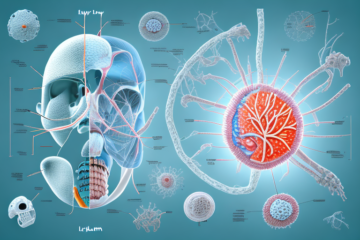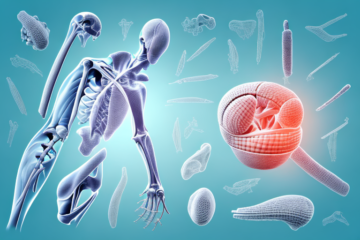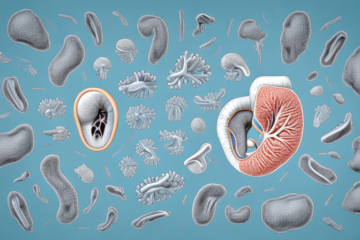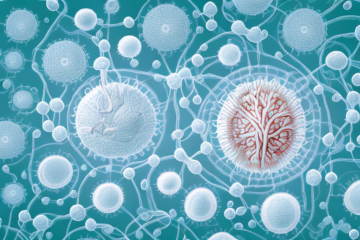The anus is a crucial part of the human digestive system, responsible for removing unwanted waste from the body. Despite its importance, it’s often a topic that many feel uncomfortable discussing. In this article, we will provide an in-depth overview of the anatomy and function of the anus, common disorders affecting it, as well as maintaining good anal health.
The Anatomy of the Anus: Understanding its Structure
The anus is a muscular opening at the end of the digestive tract. It is made up of two sphincters – the internal and external anal sphincters. The internal sphincter is an involuntary muscle that is controlled by the autonomic nervous system, while the external sphincter is a voluntary muscle that is controlled by the somatic nervous system. Together, these two sphincters work in coordination to control the release of feces from the body. They also play a vital role in maintaining continence and preventing accidental bowel movements.
In addition to the sphincters, the anus is also lined with specialized skin cells called keratinocytes. These cells provide a protective barrier against the harsh environment of the rectum and anus. The anus also contains a rich network of blood vessels and nerve endings, which allow for the sensation of touch and pain. This complex anatomy of the anus is essential for its proper function and overall health.
What is the Function of the Anus?
The primary function of the anus is to act as a gateway for excreting waste material from the body. When waste materials such as feces and gas accumulate in the rectum, the internal sphincter relaxes, triggering a signal for defecation. The external sphincter then relaxes to allow the waste material to pass through the anus and out of the body. Additionally, the anus also plays a role in sexual activity by providing a sensory experience during anal sex.
It is important to note that the anus is a sensitive area and can be prone to certain medical conditions such as hemorrhoids, anal fissures, and infections. Maintaining good hygiene and seeking medical attention if any discomfort or abnormality is experienced is crucial for overall health and well-being.
How Does the Anus Work in the Digestive System?
The anus is the final segment of the gastrointestinal tract. It receives undigested food materials from the colon or large intestine in the form of feces. These materials begin to accumulate in the rectum until they reach a certain threshold. When this threshold is reached, the internal sphincter relaxes to signal the brain that it’s time to defecate. The rectum then contracts, pushing the fecal material through the anal canal and out of the body.
However, the anus is not just a one-way passage for fecal matter. It also has a role in sexual function. During sexual arousal, the anus can become engorged with blood, leading to increased sensitivity and pleasure. This is why anal stimulation is a common practice in some sexual activities.
It’s important to note that the anus is a delicate area and can be prone to injury and infection. Proper hygiene and safe sexual practices are crucial to maintaining the health of the anus and surrounding areas.
The Role of the Anus in Waste Removal
The anus is an essential organ in the removal of waste materials from the body. Failure of the anus to function correctly can lead to serious health complications such as fecal incontinence – a condition characterized by a lack of control over bowel movements. This can cause significant discomfort and embarrassment for individuals who suffer from it. Other disorders that affect the anus include hemorrhoids, anal fissures, and anal abscesses.
In addition to its role in waste removal, the anus also plays a crucial role in sexual function. During sexual activity, the anus can be stimulated to provide pleasure and can be a source of sexual satisfaction for some individuals. However, it is important to note that anal sex can also increase the risk of sexually transmitted infections and should be practiced safely with the use of condoms and lubrication.
Common Disorders Affecting the Anus and Rectum
One common condition affecting the anus is hemorrhoids. Hemorrhoids occur when the veins in the anus become swollen and inflamed, leading to discomfort, itching, and bleeding. Another common condition is anal fissures, which are small tears or cracks in the anus that can be painful and lead to bleeding during bowel movements. Anal abscesses and fistulas are also prevalent conditions affecting the anus that can cause pain, discomfort, and discharge.
Aside from the aforementioned conditions, there are other disorders that can affect the anus and rectum. One of these is rectal prolapse, which occurs when the rectum protrudes through the anus. This can cause discomfort, pain, and difficulty with bowel movements. Another condition is anal cancer, which can develop in the tissues of the anus and rectum. Symptoms of anal cancer include bleeding, pain, and discharge.
It is important to seek medical attention if you experience any symptoms related to the anus and rectum. A healthcare provider can diagnose and treat these conditions, and may recommend lifestyle changes or medications to manage symptoms. In some cases, surgery may be necessary to correct the issue.
Anal Fissures: Causes, Symptoms, and Treatment Options
Anal fissures are caused by several factors such as straining during bowel movements, injury, or childbirth. Symptoms of anal fissures include pain during bowel movements, itching, and bleeding. Treatment options for anal fissures include warm baths, over-the-counter pain relievers, and fiber supplements to soften stools. For severe cases, surgery may be required to remove the fissure.
It is important to note that anal fissures can also be caused by certain medical conditions such as Crohn’s disease or ulcerative colitis. In these cases, treating the underlying condition is necessary to fully heal the fissure. Additionally, maintaining good hygiene practices such as wiping gently and thoroughly after bowel movements can help prevent further irritation and promote healing.
While anal fissures can be uncomfortable and painful, they are generally not a serious health concern. However, if left untreated, they can lead to complications such as infection or chronic pain. It is important to seek medical attention if symptoms persist or worsen despite at-home treatments.
Hemorrhoids: Symptoms, Causes, and Treatment Options
Hemorrhoids are common in both men and women and are caused by factors like constipation, pregnancy, and obesity. Symptoms include itching, bleeding, and pain. Treatment options include lifestyle modifications such as increasing fiber intake, staying hydrated, and avoiding straining during bowel movements. Topical treatments such as creams and ointments are also available, as well as minimally invasive procedures such as rubber band ligation, infrared coagulation, and sclerotherapy.
It is important to note that while hemorrhoids are a common condition, they can also be a sign of a more serious underlying issue such as colorectal cancer. It is recommended to consult with a healthcare provider if symptoms persist or worsen despite treatment.
In addition to the aforementioned treatment options, some individuals may require surgical intervention for severe or persistent hemorrhoids. Procedures such as hemorrhoidectomy and stapled hemorrhoidopexy may be recommended by a healthcare provider in these cases.
Understanding Anal Abscesses and Fistulas
Anal abscesses and fistulas occur when bacteria enter the anal canal, leading to the formation of pus. Symptoms include pain, swelling, and discharge. Treatment options include antibiotics for mild cases, while more severe cases may require surgical intervention.
It is important to note that anal abscesses and fistulas can be caused by a variety of factors, including Crohn’s disease, sexually transmitted infections, and trauma to the anal area. Therefore, it is important to seek medical attention if you experience any symptoms.
Preventative measures can also be taken to reduce the risk of developing anal abscesses and fistulas. These include maintaining good hygiene practices, avoiding anal sex, and managing any underlying medical conditions that may increase the risk of infection.
Bowel Incontinence: Causes, Symptoms, and Treatment Options
Bowel incontinence is a common condition affecting the anal sphincter muscles, leading to the involuntary release of fecal material. Symptoms include loss of bowel control, abdominal pain, and diarrhea. Treatment options include dietary modifications, medication, and surgery.
There are several causes of bowel incontinence, including nerve damage, muscle weakness, and chronic diarrhea. Nerve damage can occur due to childbirth, surgery, or certain medical conditions such as multiple sclerosis. Muscle weakness can be caused by aging, injury, or radiation therapy. Chronic diarrhea can also lead to bowel incontinence by irritating the anal sphincter muscles.
Diagnosis and Treatment of Anal Cancer
Anal cancer is a rare type of cancer that affects the anus. Symptoms include pain, swelling, and discharge. The diagnosis of anal cancer involves a physical exam, biopsy, and imaging studies. Treatment options include chemotherapy, radiation therapy, and surgery, depending on the stage of the disease and the extent of its spread.
It is important to note that early detection and treatment of anal cancer can greatly improve the chances of a successful outcome. Regular screenings and check-ups with a healthcare provider can help identify any potential issues early on. Additionally, lifestyle changes such as quitting smoking and maintaining a healthy diet and exercise routine can also help reduce the risk of developing anal cancer.
Maintaining Good Anal Health: Tips and Strategies for Prevention
To maintain good anal health, it is essential to practice good hygiene habits, including regular cleaning of the anal area after bowel movements. Increasing fiber intake to regulate bowel movements and drinking plenty of water can also help prevent constipation. Avoiding straining during bowel movements, particularly when constipated, can help reduce the risk of developing anal fissures and hemorrhoids. It’s also crucial to seek medical attention for any unusual anal-related symptoms.
In addition to these preventative measures, there are also certain lifestyle changes that can promote good anal health. For example, engaging in regular exercise can help improve bowel function and reduce the risk of constipation. Additionally, avoiding excessive alcohol consumption and smoking can also help reduce the risk of developing anal-related health issues. It’s important to remember that maintaining good anal health is an important aspect of overall health and well-being, and should not be overlooked or ignored.
The Importance of Regular Check-ups with a Colorectal Specialist
Regular check-ups with a colorectal specialist are vital to maintaining good anal health. These specialists can examine the anus and rectum to identify any potential issues and recommend appropriate treatment. Having a regular colonoscopy screening can also help detect any cancerous growths early on, increasing the chances of successful treatment.
It is recommended that individuals over the age of 50, or those with a family history of colorectal cancer, undergo regular colonoscopy screenings. However, even those without any risk factors should still consider regular check-ups with a colorectal specialist to ensure optimal anal health. In addition to cancer screenings, these specialists can also provide guidance on maintaining a healthy diet and lifestyle to prevent future issues.
How to Prepare for an Anal Exam
Before an anal exam, it’s essential to ensure your anal area is clean. This can be done by taking a warm bath or using a sitz bath. Avoiding food or drink that may cause diarrhea or constipation before the exam is also crucial. When preparing for an anal exam, it’s important to ask your healthcare provider what to expect, such as whether you will need to modify your diet or take any medications before the procedure.
It’s also important to communicate any concerns or discomfort you may have with your healthcare provider before the exam. They may be able to provide additional information or offer solutions to help ease any anxiety or pain during the procedure. Additionally, it’s recommended to wear loose, comfortable clothing to the appointment to ensure ease of movement and to avoid any unnecessary discomfort.
When to Seek Medical Attention for Anus-Related Symptoms
It’s crucial to seek medical attention for any unusual symptoms related to the anus or rectum. These may include bleeding, pain, or discharge. Ignoring these symptoms can lead to serious health complications like fecal incontinence or cancer. Seeking medical attention can help diagnose and treat any underlying conditions early, leading to better outcomes.
In conclusion, the anus plays a vital role in the human digestive system, and understanding its anatomy and function is crucial for maintaining good anal health. By practicing good hygiene habits and seeking medical attention when needed, individuals can prevent and treat common disorders affecting the anus, leading to a happy and healthy life.
It’s important to note that some anus-related symptoms may be indicative of sexually transmitted infections (STIs). These symptoms may include itching, burning, or unusual discharge. If you are experiencing any of these symptoms, it’s important to seek medical attention and get tested for STIs. Early detection and treatment can prevent the spread of infection and reduce the risk of long-term health complications.

